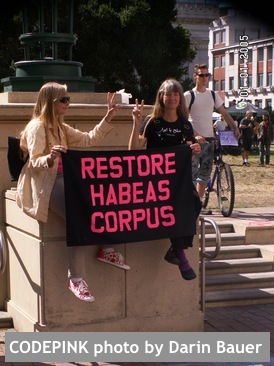 A California Law Review debate about the treatment of detainees during wartime will likely include discussion of the torture of prisoners at Guantanamo Bay Prison Camp, where 800 years of Habeas Corpus law -- the right to know why you are being held captive by the State -- came undone.
A California Law Review debate about the treatment of detainees during wartime will likely include discussion of the torture of prisoners at Guantanamo Bay Prison Camp, where 800 years of Habeas Corpus law -- the right to know why you are being held captive by the State -- came undone.
The Symposium on Habeas Corpus in Wartime will take place at Berkeley Law in Booth Auditorium on April 6, 2018 from 9:00am to 4:00pm with a reception to follow. For speakers and event details, visit bit.ly/habeaswartime#HabeasWartime.
Should constitutional law be applied to U.S. wars of aggression? What happens when you don't deal with the crime of indefinite detention? University of Texas panelist Stephen Vladeck advocates closing Gitmo (good) but he, and others, are prepared to subject "Forever Prisoners" to Obama-era Periodic Review Boards. True "closure" of the detention camp can only be accomplished with a determination to charge or release all inhabitants.
"Closing Guantánamo the right way requires ending indefinite detention without charge or trial; transferring detainees who have been cleared for transfer; and trying detainees for whom there is evidence of wrongdoing in our federal criminal courts here in the U.S.," asserts the ACLU. "If a prosecutor cannot put together a case against a detainee, there is no reason that person should continue to be imprisoned."
"The degree of civilization in a society can be judged by entering its prisons," wrote Russian novelist Fyodor Dostoevsky in The House of the Dead. The cruel, inhumane, and degrading treatment -- torture -- inflicted on disfranchised subjects, from Pelican Bay in California to Bagram, Afghanistan, must not only end; the presumption of American immunity to international law must be repudiated. Dismantling of U.S. torture camps can't wait. And that is up to us.

